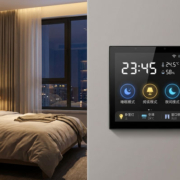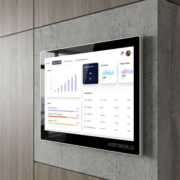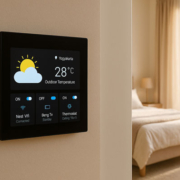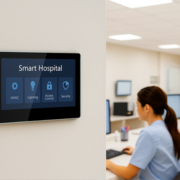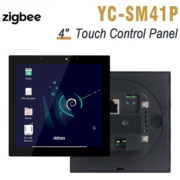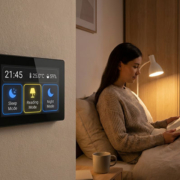Smart Control Panel PCBA Development — Portworld’s Advanced Embedded Design Solutions
In the world of smart homes, building automation, and industrial control, the Smart Control Panel serves as the core interface that connects users to intelligent systems. Behind every responsive touchscreen, seamless interaction, and stable operation lies a crucial component — the PCBA (Printed Circuit Board Assembly).
Developing a high-performance Smart Control Panel PCBA requires not just advanced hardware design but also deep integration of embedded software, communication protocols, and power management. As a professional embedded solutions provider, Portworld offers complete PCBA development services tailored for smart control panels, delivering innovation, performance, and reliability from concept to production.
1. What is a Smart Control Panel PCBA?
A Smart Control Panel PCBA is the electronic heart of a smart display or automation terminal. It integrates the processor, memory, power supply, display driver, communication modules, and I/O interfaces onto a single board, enabling real-time data processing and multi-device communication.
In modern smart environments, PCBAs power devices such as:
- Smart home wall-mounted touch panels
- Building management and access control terminals
- Hotel room automation displays
- Industrial control and HMI systems
- Meeting room scheduling and environmental monitoring panels
Portworld specializes in designing these PCBA solutions to support Android, Linux, Debian, and other embedded operating systems — allowing flexibility across different applications and environments.
2. Portworld’s Expertise in Smart Control Panel PCBA Development
At Portworld, PCBA development is more than circuit design — it’s about creating a complete embedded ecosystem. Our engineering team provides end-to-end support, including hardware layout, firmware development, and system optimization for both standard and customized projects.
Core Capabilities Include:
- Custom PCB Layout Design – Tailored according to project requirements, including CPU, RAM, eMMC, and I/O interfaces.
- Processor Integration – Based on high-performance SoCs such as Rockchip RK3566, RK3568, and RK3576, ensuring excellent balance of power and performance.
- Firmware & BSP Development – Building stable Android/Linux systems with optimized drivers and SDK support.
- Communication Interfaces – Support for RS485, RS232, CAN, GPIO, I2C, MIPI, LVDS, Wi-Fi, Bluetooth, and PoE.
- Thermal and Power Design – Ensuring reliable operation under long-term, 24/7 conditions.
- Testing & Validation – Strict quality control with automated testing and firmware verification before mass production.
3. Typical PCBA Platforms for Smart Control Panels
Portworld has developed multiple ready-to-use and customizable PCBA platforms to meet diverse industry needs:
YC-P6602 (RK3566 Platform)
- Quad-Core Cortex-A55 Processor
- Supports Android, Ubuntu, Debian, Buildroot
- Integrated Wi-Fi, Bluetooth, Ethernet
- Ideal for smart home panels, hotel automation, and intercom systems
P6802 (RK3568 Platform)
- High-performance SoC with extended interfaces
- Dual Gigabit Ethernet (one PoE)
- Supports MIPI LCD, I2C touch, USB, and PCIe
- Designed for industrial automation and advanced HMI applications
These platforms provide a stable foundation for custom smart control panel PCBAs, helping partners accelerate development and reduce time-to-market.
4. OEM/ODM Development Process at Portworld
Portworld’s OEM/ODM PCBA development process ensures that every smart control panel project receives professional engineering attention from concept to delivery:
- Project Consultation – Understanding customer requirements and intended application scenarios.
- Hardware Design – Customizing PCB layout, interface mapping, and component selection.
- Software Integration – Building Android or Linux firmware, drivers, and BSP optimization.
- Prototype Testing – Providing working samples for functional validation.
- Mass Production – Scalable manufacturing with strict quality inspection.
- After-Sales Support – Continuous firmware updates, SDK documentation, and technical assistance.
This structured workflow ensures flexibility, scalability, and cost efficiency for both small-batch and large-scale production.
5. Advantages of Portworld’s PCBA Development for Smart Control Panels
High Customization Flexibility – Adaptable design to meet unique requirements for hardware, OS, and interfaces.
Industrial-Grade Reliability – Designed for continuous, long-term operation with stable performance.
Wide OS Support – Compatible with Android, Linux, Debian, Ubuntu, and Buildroot.
Optimized Connectivity – Comprehensive interface support for IoT integration and automation networks.
Short Time-to-Market – Ready-to-deploy reference designs reduce development cycles.
Complete OEM/ODM Support – From prototype to mass production under one roof.
6. Applications of Portworld’s Smart Control Panel PCBA Solutions
Portworld’s PCBAs are widely adopted in:
- Smart Homes – Wall-mounted touch panels, lighting and HVAC controllers
- Commercial Buildings – Room booking and access control systems
- Hotels – Guest room automation and energy management panels
- Industrial Control – Embedded HMIs and machine monitoring systems
- Retail & Digital Signage – Interactive kiosks and information terminals
Each application benefits from Portworld’s modular design, which enables fast customization, stable connectivity, and long-term durability.
The success of any smart control panel depends on the strength of its underlying PCBA — the foundation that powers performance, connectivity, and user experience. With years of experience in embedded systems, Portworld leads the way in Smart Control Panel PCBA development, offering flexible, efficient, and scalable solutions for global partners.
Whether you’re developing a smart home terminal, industrial HMI, or commercial automation interface, Portworld’s PCBA platforms and OEM/ODM services provide everything you need — from design to deployment.

